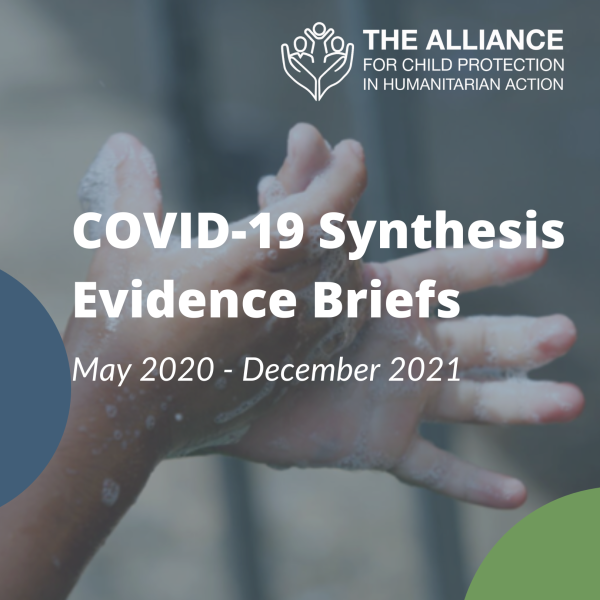
COVID-19 Synthesis | Evidence Briefs

Overview:
The COVID-19 Synthesis series is a periodic digest of COVID-19 related resources (guidance, news, and academic articles), with the purpose to identify emerging child protection risks, responses, and apparent resource gaps. Each synthesis analyses a different topic related to child protection during COVID-19. [Read more]
Find the full set of resources and articles on key CPMS Standards and topics around child protection and COVID-19 in the COVID-19 Resource Tracker.
Topic 1: Sexual and Gender-Based Violence (1-22 May 2020)
The purpose of this evidence synthesis is to take stock of the emergent SGBV issues as they arise in news media and from academic sources and produce a short digest that can identify emerging child protection risks and gaps related to the evidence gathered in order to supplement practitioner analyses and responses. [Read more]
Topic 2: Child Labour (1-12 June 2020)
The purpose of this evidence synthesis is to examine what is known about child labour in light of COVID-19. It was carried out by identifying 2 webinars and 20 news articles published between April 22 and June 12, 2020, in either English or French, as well as 24 reports and guidance notes that provided evidence of emerging COVID-19 related child protection risks, or anticipated risks, on different aspects of child labour. The rest of this synthesis is organized in the following way: child labour risks are illustrated by using examples from select articles and research studies; key gaps in the data are gathered, discussed and summarized; and protective factors and reported practices are identified. [Read more]
Topic 3: Impact of School Closures on Children's Protection and Wellbeing (15 June - 10 July 2020)
The purpose of this evidence synthesis is to examine the impact of school closures on the protection and wellbeing of children globally, with a focus on the majority world. It was carried out by reviewing existing literature published in English and French. This included 31 academic articles and reports and guidance notes from the grey literature; and 59 news articles published online between April 22 and July 13, 2020. [Read more]
Topic 4: Children's Participation (6-17 July 2020)
The purpose of this evidence synthesis is to analyze emerging practices and preliminary guidance for engaging children in the response to child protection challenges during the various stages of COVID-19 and other infectious disease outbreaks (e.g. Ebola). It explores both barriers and opportunities to the meaningful and authentic participation of children during COVID-19. This analysis draws from 48 academic articles and reports and guidance notes from the grey literature; and 24 news articles published online between April 22 and August 7, 2020 to illustrate child participation barriers and opportunities, discuss key emerging practices, and promote the meaningful participation of children. [Read more]
Topic 5: Forcibly Displaced Children (01 September - 01 October)
The purpose of this evidence synthesis is to analyze the primary and secondary impacts of the pandemic on children who are refugees, IDPs and/or migrants and highlights important protective factors and emerging response measures identified in a review of recent news media, project reporting, academic research and other relevant resources mapped over the previous five-month period. The rest of this synthesis is organized in the following way: we illustrate child participation barriers and opportunities by using examples from select articles and research studies, discuss key emerging practices in the information identified, and conclude with reflections and recommendations on more effectively responding to the needs of refugee, IDP and forced migrant children during COVID-19. [Read more]
Topic 6: Mental Health and Psychosocial Support Among Children in Humanitarian Settings (August 2021)
The purpse of this evidence synthesis is to summarize what is already known about the impacts of the pandemic on children’s mental health risks, specifically in humanitarian settings with the aim of providing an overview of evidence to date. This synthesis captures the toll that COVID-19 and public health measures to reduce its transmission have taken on children’s mental health worldwide due to stressors from social isolation, family hardships, school closures, service interruptions, and economic crises. Evidence relevant to mental health and psychosocial support generally and in conflict-affected settings were included. Together, 52 academic articles and resources and 21 news articles from April 2020 to July 2021 were compiled for this report. [Read more]
Topic 7: Strengthening Caregiving Environments: Prioritising Family- Based Care in Humanitarian Settings During COVID-19 (December 2021)
The purpose of this evidence synthesis is to analyze the ways in which the COVID-19 pandemic and the public health measures to contain it are threatening caregiving environments. Children are at risk of separation from their families due to COVID-19 related illness, and death of a parent or a caregiver. They are also at risk of separation as a result of secondary impacts of the pandemic, such as job loss, school closures, restrictions to movement, and social isolation. The secondary impacts emanating from the pandemic can exacerbate protection risks, such as domestic abuse, family conflicts, rising poverty, and family stress. These, in turn, can lead to family separation and/or violence. Therefore, this brief focuses on strategies to strengthen the caregiving environment through family- and community-based approaches. It also offers a series of case studies from various humanitarian and emergency contexts. [Read more]
- 2365 views
